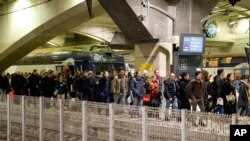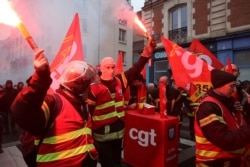Teachers, doctors, Eiffel Tower employees and workers across the French labor force walked off the job Tuesday to resist a higher retirement age and to preserve a welfare system they fear their business-friendly president wants to dismantle.
Lighting red flares and marching beneath a blanket of multi-colored union flags, thousands of angry workers snaked through French cities from Brittany on the Atlantic to the Pyrenees in the south to oppose President Emmanuel Macron's overhaul of the French pension system.
Commuters and tourists faced a 13th straight day of traffic headaches as train drivers kept up their protest of changes to a system that allows them and other workers under special pension regimes to retire as early as their 50s.
"Monument Closed" read a sign on the glass wall circling the base of the Eiffel Tower, which was shut for the second time since the strike, one of the most protracted French strikes in years, started Dec. 5.
"It's very frustrating for us, unfortunately," South African tourist Victor Hellberg said, gazing up at the 19th century landmark. "We had decided to be here for one day and that's life I suppose."
Victor Garcia, visiting from Barcelona, said he's is used to protests in the Spanish city, but admitted not climbing the tower's steps "is kind of a bummer."
Parents faced shuttered schools and students had key exams canceled as teachers joined in the strike.
Hospitals requisitioned workers to ensure key services Tuesday, as nurses, doctors and pharmacists went on strike to save a once-vaunted public hospital system that's struggling after years of cost cuts.
Police in Paris barricaded the presidential Elysee Palace hours ahead of a new protest on Tuesday afternoon, bracing for potential violence by yellow vest activists or other radical demonstrators angry over economic injustice.
Across the French capital, union leaders demanded that Macron drop the retirement reform.
"They should open their eyes," Philippe Martinez, the head of hard-left union CGT, said at the head of the Paris march.
Nationwide, the number of striking workers Tuesday was up from a similar cross-sector walkout last week., adding pressure to Macron, The president was already on the back foot after the key architect of his pension overhaul resigned Monday over alleged conflicts of interest.
So far, his government is sticking to plans to raise the retirement age to 64, though it made concessions last week by delaying the roll-out of the change and opened the door for new negotiations.
Government spokeswoman Sibeth Ndiaye said on BFM television: "The reform remains..We will not withdraw it."
Several European countries have raised the retirement age or cut pensions in recent years to keep up with lengthening life expectancy and slowing economic growth. Macron argues that France needs to do the same.
Unions fear people will have to work longer for lower pensions, and polls suggest at least of half of French people still support the strike.
Frustration is building, however. Only two of the 16 lines on the Paris subway ran normally Tuesday, and only a quarter of the high-speed trains that crisscross the country. International lines were also affected.
Unions at the SNCF rail authority want to keep the strike going through the Christmas holidays, and the government is scrambling for solutions.
While patience was running short among Metro riders squeezing into the few subways still functioning around Paris, the strike troubles weren't enough to scare away some visitors to the City of Light.
Spanish tourist Lydia Marcos, finding the Eiffel Tower unexpectedly closed, shrugged it off and said, "It's like an excuse to come here another year."





